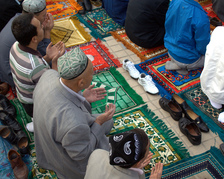Do I have to pray in the Arabic language?

In many cases, people who convert to Islam do not even know a word of Arabic. This of course poses a difficulty in that all formal prayers are given in the Arabic language. To a non-Arabic speaking convert, not only is one to memorize the words given in prayer, but in order for it to be a meaningful, beneficial and deeply spiritual action, one must also have understanding of what the words mean.
The Prophet (SAW) is reported to have said, “Pray as you see me praying.” In another hadith, the Prophet (SAW) is reported to have said, "Whoever reads one letter of the Book of Allah is credited with one blessing and one blessing is equal to tenfold the like thereof in its reward. I do not say that الم (Alif Lam Meem) is one letter, but '(ا )' (Alif) is one letter, ' ( ل )’ (Lam) is one letter, and '( م )' (Meem) is one letter," (Tirmidhi).
If a person makes concerted effort to learn and memorize properly, although that is difficult for him, Allah (SWT) will reward him for that and will make up for his shortcomings. As in Hadith al-Bukhaari (4937) and Muslim (798), ‘A’isha (RA) narrated that: The Prophet (SAW) said: “The one who is skilled in reciting Qur’an will be with the noble, honorable scribes and the one who recites Qur’an and falters therein, and finds it difficult, will have a double reward.”
As a new Muslim, one should strive in his iman to offer his/her prayer in the best most perfect way possible. In remembering the Hadiths above, this is great encouragement to strive to learn Arabic as much as possible. And further, why would anyone striving for the pleasure of Allah (SWT) deny himself from such awesome benefits? Therefore, you will need to learn how to recite the formal prayers in the Arabic language, and it is in your best interest. Be patient, it will take time for certain.
However, you should not feel that if you do not know how to say something in Arabic then you are at a loss; on the contrary; If you are in need of something and want to ask the Almighty for something to suit some need, supplicate to your Lord from your heart in your own language, Arabic or otherwise. Incidentally, one of the best times to make du'aa is in prostration (sujood: this is when your forehead is touching the floor during formal salah). Allah (SWT) knows our needs, our struggles, and He wants us to ask from Him!
Back to FAQ's
More Resources for learning Arabic:
The Prophet (SAW) is reported to have said, “Pray as you see me praying.” In another hadith, the Prophet (SAW) is reported to have said, "Whoever reads one letter of the Book of Allah is credited with one blessing and one blessing is equal to tenfold the like thereof in its reward. I do not say that الم (Alif Lam Meem) is one letter, but '(ا )' (Alif) is one letter, ' ( ل )’ (Lam) is one letter, and '( م )' (Meem) is one letter," (Tirmidhi).
If a person makes concerted effort to learn and memorize properly, although that is difficult for him, Allah (SWT) will reward him for that and will make up for his shortcomings. As in Hadith al-Bukhaari (4937) and Muslim (798), ‘A’isha (RA) narrated that: The Prophet (SAW) said: “The one who is skilled in reciting Qur’an will be with the noble, honorable scribes and the one who recites Qur’an and falters therein, and finds it difficult, will have a double reward.”
As a new Muslim, one should strive in his iman to offer his/her prayer in the best most perfect way possible. In remembering the Hadiths above, this is great encouragement to strive to learn Arabic as much as possible. And further, why would anyone striving for the pleasure of Allah (SWT) deny himself from such awesome benefits? Therefore, you will need to learn how to recite the formal prayers in the Arabic language, and it is in your best interest. Be patient, it will take time for certain.
However, you should not feel that if you do not know how to say something in Arabic then you are at a loss; on the contrary; If you are in need of something and want to ask the Almighty for something to suit some need, supplicate to your Lord from your heart in your own language, Arabic or otherwise. Incidentally, one of the best times to make du'aa is in prostration (sujood: this is when your forehead is touching the floor during formal salah). Allah (SWT) knows our needs, our struggles, and He wants us to ask from Him!
Back to FAQ's
More Resources for learning Arabic:
- Learn Qur'an --this PDF link is a handy little printable you can use as a start to improve your comprehension of Arabic words used in Qur'an! (I do not own this)
- Rosetta Stone This is software available for purchase.
- Fun with Arabic Learn the letters, forming words
